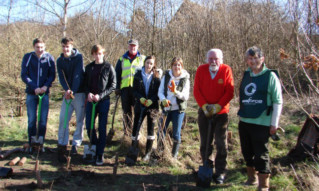Volunteers have been out in force in Monifieth to replace trees affected by ash dieback with new saplings.
Chalara ash dieback disease has been located in the Dighty Den on both sides of the Dighty burn.
Angus Council has been working with Monifieth Eco Group to coordinate the replacement tree planting with a mixture of different native species other than ash.
A council spokeswoman said: “In addition to working with Monifieth Eco Group the park department will fell ash trees if they are dead or dying or if they are likely to put at risk members of the public who access much of the area via the extensive network of footpaths that exist there.”
So far no large mature ash have been found to be infected, although the council will be carrying out further survey work this summer to monitor its progress.
There are no other known chalara-infected ash on Angus Council land. Ash dieback is a serious disease caused by the fungus chalara fraxinea.
The disease cause leaf loss and crown dieback in affected trees and can lead to the death of the tree.
The disease is increasingly being found in countries across continental Europe, but until recently had not been detected in the UK or Ireland.
To replace the infected trees Monifieth and District Rotary Club joined forces with Monifieth High School and the local EcoForce to plant hundreds of young trees at the weekend.
The saplings were provided by the Woodland Trust and the Rotary Club organised the planting.
They were assisted by pupils from the high school, led by their head teacher Mrs McInally.
A spokesman for the rotary said: “It was a wonderful day for this effort to benefit both the community and the environment.
“We have been delighted with the response, particularly the willing help provided by the young people.”
Zero Waste Scotland, which aims to reduce food waste and improve recycling rates, lent its support by providing coffee and a barbecue to sustain the planters.
